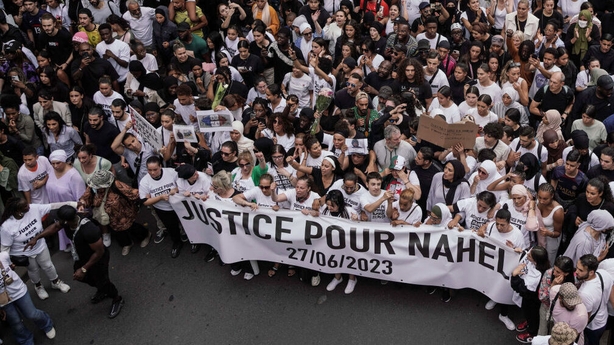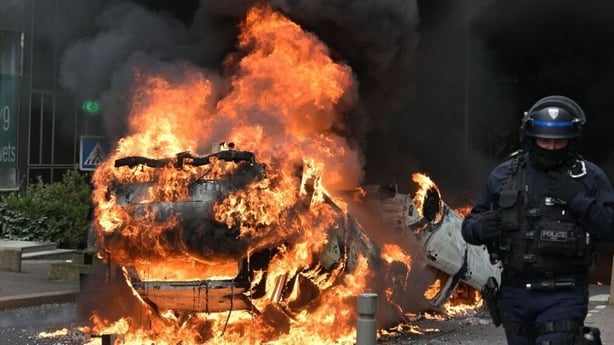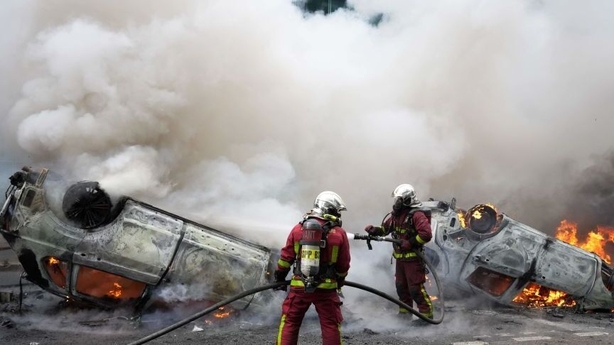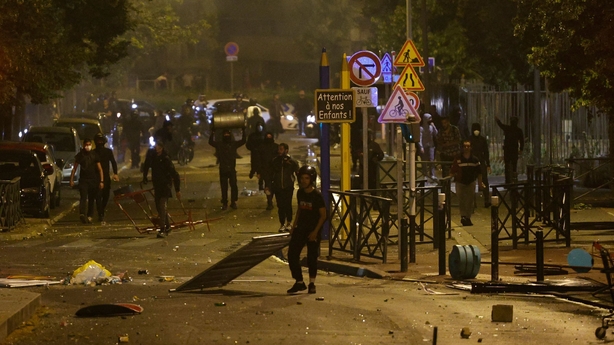Violence has erupted for a third night in major French cities as President Emmanuel Macron fights to contain mounting unrest triggered by the fatal police shooting of a teenager earlier this week.
The 17-year-old teen, named as Nahel M, of Algerian and Moroccan descent, was shot in the chest at point-blank range during a traffic stop in the Paris suburb of Nanterre on Tuesday morning.
Prosecutors said the policeman involved has been charged with voluntary homicide and is being held in custody ahead of a trial.
"The public prosecutor considers that the legal conditions for using the weapon have not been met," Pascal Prache, Nanterre prosecutor, told a news conference.
Forty thousand police officers were deployed across France today - nearly four times the numbers mobilised yesterday - but there were few signs that government appeals for a de-escalation in the violence would quell the widespread anger.
In Nanterre, protesters torched cars, barricaded streets and hurled projectiles at police following a peaceful vigil this afternoon.
Demonstrators wrote "Vengeance for Nahel" across buildings and bus shelters and as night drew in a bank was set on fire before firemen put it out.
Local authorities in Clamart, 8km from central Paris, imposed a nighttime curfew until Monday.
All bus and tram services in the greater Paris area stopped at 9pm tonight (8pm Irish time) after some public transport vehicles were set alight last night.
Tonight, police said that officers faced new incidents in Marseille, Lyon, Pau, Toulouse and Lille including fires and fireworks.
In Marseille, France's second city, police fired tear gas during clashes with youths in the tourist area of Le Vieux Port, the city's main paper La Provence reported.
"The response of the state must be extremely firm," Interior Minister Gerald Darmanin said earlier, speaking from the northern town of Mons-en-Baroeul where several municipal buildings were set alight.
The shooting has fed longstanding complaints of police violence and systemic racism inside law enforcement agencies from rights groups and within the low-income, racially mixed suburbs that ring major cities in France.

The teenager was shot during Tuesday's morning rush hour.
He initially failed to stop after the car he was driving was spotted in a bus lane.
Two police officers caught up with the vehicle in a traffic jam.
When the car made to get away, one officer fired at close range through the driver's window.
Nahel died from a single shot, Nanterre public prosecutor Pascal Prache said.
The policeman has acknowledged firing a lethal shot, the prosecutor added, telling investigators he wanted to prevent a car chase, fearing he or another person would be hurt after the teenager allegedly committed several traffic violations.

The officer's lawyer Laurent-Franck Lienard said his client had aimed down towards the driver's leg but was bumped, causing him to shoot towards his chest.
"He had to be stopped, but obviously (the officer) didn't want to kill the driver," Mr Lienard said on BFM TV, adding that his client's detention was being used to try to calm rioters.
"The first words he pronounced were to say sorry and the last words he said were to say sorry to the family," Mr Lienard added.
He is to appeal tomorrow his client's detention in custody.
The victim was known to police for previously failing to comply with traffic stop orders, Mr Prache said.
French President Emmanuel Macron described the upsurge in violence in the wake of the shooting as "unjustifiable" - a day after describing the incident as "inexcusable".
Read more:
What we know about police shooting of French teenager
Explainer: French use of force at traffic stops
At a march in Nanterre, in memory of Nahel, participants railed against what they perceived as a culture of police impunity and a failure to reform law enforcement in a country that has experienced waves of rioting and protests over police conduct.
Thousands thronged the streets shouting "No justice, no peace!" and "Everyone hates the police!".
The teenager's mother waved to the crowd from an open-top lorry wearing a white T-shirt reading "Justice for Nahel" and the date of his death.
"I have nothing against the police. I have something against one person, he who killed my son. He did not have to kill my son," Nahel's mother told France 5 television after the march.
Assa Traoré, a well-known activist against police violence whose brother died after being arrested in 2016, told the rally: "The whole world must see that when we march for Nahel, we march for all those who were not filmed."
The local MP from France's Greens party Sabrina Sebaihi said: "This march is a moment of meditation and mourning for the family, it is important to respect it."
At first there was no sign of the violence but tensions then rose, with protesters throwing missiles at police.
Security forces dispersed the crowd by firing tear gas.
More than 6,000 people were at the march, according to a police source.

Last night, clashes spread from neighbourhoods around Paris to other French cities, including Toulouse, Dijon and Lyon.
South of the capital, around 20 young people wearing balaclavas attacked the main guard post at Fresnes prison, France's second biggest jail, with incendiary devices and other projectiles, video footage showed.
According to a union representative at the prison, Andy Noel, the alarm was quickly sounded, and staff living on site or nearby rushed to the scene.
"They made themselves available to do what was needed," he said, adding that no member of staff was hurt.
Tensions also flared in Roubaix, Amiens and Nice.
Police said that 180 people were arrested.

The unrest has revived memories of riots in 2005 that lasted for three weeks and forced then-president Jacques Chirac to declare a state of emergency.
That wave of violence erupted in the Paris suburb of Clichy-sous-Bois and spread across the country following the death of two young people electrocuted in a power substation as they hid from police.
Two officers were acquitted in a trial ten years later.
This week's killing was the third fatal shooting during traffic stops in France in 2023, down from a record 13 last year, a police spokesperson said.
There were three such killings in 2021 and two in 2020, according to a Reuters tally, which shows the majority of victims since 2017 were black or of Arab origin.
Karima Khartim, a local councillor in Blanc Mesnil north east of Paris, said people's patience was running thin.
"We've experienced this injustice many times before," she said.
